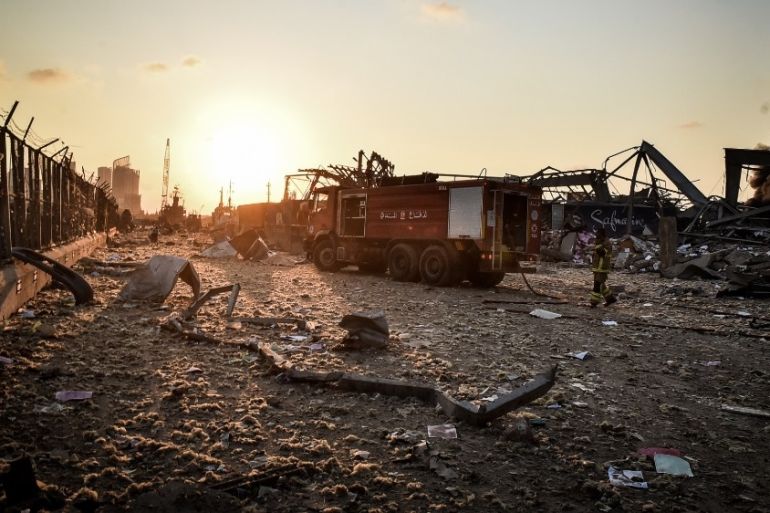How Beirut firefighters were sent into disaster
A team of 10 was ordered to respond to a fire at the Beirut port. They did not know what they were heading for.

Beirut, Lebanon – About five minutes before 6pm (15:00 GMT) on Tuesday, Beirut’s fire brigade received a call from the police, who told them that witnesses had spotted smoke billowing out of the city’s port.
First Lieutenant Raymond Farah was the one to receive the call. “I told them that I won’t send out my fire trucks before knowing what kind of fire it is. I need to know what’s there,” he told Al Jazeera.
Keep reading
list of 4 itemsParallel seasons: How Lebanon hides from reality
Lebanon’s FIBA World Cup journey is about much more than basketball
Justice for the Beirut blast can help avert Lebanon’s collapse
“An officer from state security called and said it was a hangar with just fireworks. Knowing that, and based on the order of the commander of the firefighters, I gave the order to go.”
Immediately, a team of 10 – nine male firefighters and a female paramedic – got into a fire truck and an ambulance and raced towards the port, a short drive from their location in the city’s Karantina neighbourhood.
They were waved through the port’s gates by army personnel stationed at its doors.
Farah was in close contact with them. “They called after they arrived and said, ‘There’s something wrong here; there is a crazy sound and a huge fire.'”
The team asked for support. Farah rang the fire bell and those on duty sprang into action – picking up kit, and running downstairs to where the fire engines are. Farah watched a driver get in one fire engine and slam the door – and then the explosion hit.
“First the air hit us, then it was very hot. Not two stones were left on top of each other in the command centre,” Farah said. The blast, fuelled by some 2,750 tonnes of ammonium nitrate stored in Hangar 12 at the port, ripped through their command centre and rolled across Beirut. At least 154 people have died so far, while more than 5,000 are wounded.
The top floors of the buildings were devastated, according to the commander of Beirut’s firefighters, Brigadier General Najib Khankarli. “In a way, those at the port saved the people at the centre by calling in support. If they were in their offices, they wouldn’t have made it,” he told Al Jazeera.
After tending to the wounded, Farah ran out onto the street, waved down a motorbike and was driven to the port. “When I got to near the hangar, there was no fire truck, no ambulance. It was as if they evaporated,” he said. “The biggest piece of them we’re finding is the size of a hand.”
Sahar Fares, the paramedic, has been confirmed dead and was buried in an emotional funeral on Thursday. The missing firefighters – Najib and Charbel Hitti, Ralph Mallahi, Charbel Karam, Joe Noun, Rami Kaaki, Joe Bou Saab, Elia Khzami, and Mathal Hawa – are presumed dead.
Farah, Khankarli, and the head of the Beirut police force, Mohammad Ayoubi, all said they had no idea that the huge amount of highly explosive ammonium nitrate was stored at the port.
“Had we known that there was this amount of explosive material in the port, we would have acted completely differently. We would have called for an evacuation of the area and definitely we wouldn’t have sent these young men and women in,” Khankarli said.

Questions over negligence
Correspondence between various officials and agencies has shown that the Beirut port authority, Lebanese customs, the army and the judiciary were aware of the presence of the ammonium nitrate in Beirut’s port since shortly after its arrival in November 2013 by a cargo ship.
Successive public works ministers, nominally in charge of overseeing the port, also had knowledge of its presence. Public Works Minister Michel Najjar told Al Jazeera that the ministry sent at least 18 letters to the judiciary asking for the material to be disposed of since its arrival.
The State Security, an intelligence agency, began an investigation into the matter in 2019, referring its findings to the prime minister’s office, army intelligence and customs.
But both the army and State Security personnel at the port failed to warn firefighters who they came into contact with in the minutes before the explosion. Several members of State Security, army, and security personnel were also killed in the explosion, suggesting that those on the ground were not aware of what was inside Hangar 12.
“I’m sure that if these personnel knew what was inside, they would have run away and they wouldn’t have died,” Farah said. “It’s the big ones who had the information.”
The Lebanese investigation committee overseeing the matter, headed by Prime Minister Hassan Diab, includes both the army and State Security.
Rights organisations including Human Rights Watch and Amnesty International have called for the involvement of international experts in the investigation, citing a lack of trust in Lebanese authorities, as did French President Emmanuel Macron in Beirut on Thursday, calling it “a matter of credibility”.
Khankarli said: “Hopefully we find those who are still missing, and the victims get justice.”